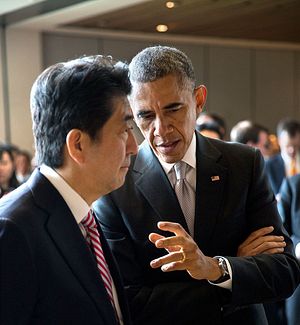Japanese Prime Minister Shinzo Abe will arrive in the U.S. for a state visit on April 26, making him the first Japanese prime minister to pay an official visit to Washington since 2006 (there have been a number of “working visits,” however, including a trip by Abe himself to Washington, D.C. in 2013). There are a variety of issues on the agenda for Abe’s first state visit to the U.S., from the Trans-Pacific Partnership (TPP) to new defense guidelines for the U.S.-Japan alliance. Speaking to journalists in Washington D.C., Japanese Ambassador Kenichiro Sasae called Abe’s visit “epoch-making,” saying the two sides will discuss their “common vision” for the future of the alliance.
Part of that discussion will center on how the alliance will function in the face of a changing regional and global security environment. Sasae said the new defense guidelines currently under discussion will aim to “update, modernize and strengthen the alliance framework, reflecting the changes” in the security environment (including new challenges in the space and cyber domains).
During Abe’s visit, he and Obama will also discuss how the U.S.-Japan alliance should address regional security tensions. Sasae described the current security situation as a “grey area” – neither problem-free nor on the brink of armed conflict. Tensions in the region are particularly high as the military balance shifts thanks to China’s military modernization program. Although Sasae made it clear in a previous interview with The Diplomat that Japan doesn’t “define China as a threat,” Japan has expressed concern over a lack of transparency regarding China’s military build-up as well as China’s assertive actions in the East and South China Sea.
New defense guidelines will seek to equip the alliance in order to respond to the new security environment. The U.S. has long pushed for Japan to shoulder more of the burden for providing for its own and regional security, changes now made possible by new security legislation that should be taken up by Japan’s Diet later this year. At the same time, however, Sasae said Japan believes the U.S. should continue to give the “proper message” about its standing in the region.
The debate over TPP has increasingly taken on shades of this on-going security dilemma in the Asia-Pacific. In his 2015 State of the Union address, Obama described TPP as an opportunity for the U.S. to forestall Chinese attempts to “write the rules” for global trade. More recently, Secretary of Defense Ash Carter emphasized the strategic benefits of the TPP, calling it “as important… as another aircraft carrier.”
However, Japan is reluctant to adopt similar rhetoric to argue in favor of the TPP, even while acknowledging the strategic importance of the deal. In discussions of the TPP, the China factor has become “inflated,” Sasae said. He explained that the agreement is “not [an] exercise to counter China” but an “exercise to set high standards, new rules in the 21st century.” China will be welcome to join if it can meet those standards, Sasae said, acknowledging that doing so would require “enormous domestic reform” on China’s part.
Sasae’s explanation of the TPP is quite similar to that used early on by the Obama administration. The change to an emphasis on the strategic importance of the TPP – and framing it as part of a competition against China – may be Obama’s way of trying to garner domestic support for the negotiations. Congress still hasn’t passed a bill granting the Obama administration Trade Promotion Authority (TPA), although both the House and Senate are currently working on drafts of such legislation. The United States’ fellow TPP negotiators – including Japan, as well as 10 other countries – consider TPA crucial to finalizing the agreement.
Accordingly, a large goal of Abe’s visit will be to reaffirm the importance of TPP – and hopefully to convince Congress to move forward with TPA. Sasae envisions Abe’s visit as a “major engine” for the TPP moving forward. On April 29, Abe will become the first Japanese prime minister to address a joint session of Congress, and he will use this opportunity to seek Congressional support for TPP and TPA. Sasae said embassy officials have already held meetings with senators and representatives in preparation for Abe’s visit, with much of the conversation focusing on TPP.
One point not likely to be a major topic during Abe’s visit is history. Sasae said Abe’s speech before Congress will focus on the U.S.-Japan alliance and the progress that has been made since World War II. As for the war itself, Sasae speculated that Abe would touch on the subject but emphasized that a speech before the U.S. Congress is “not a place to address other countries.” A focus on history is “not something the United States is asking for,” Sasae said, adding that wartime history would not be a major part of the agenda for Tokyo and Washington.

































